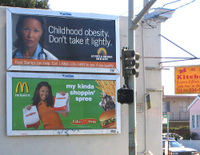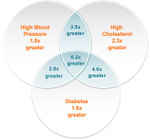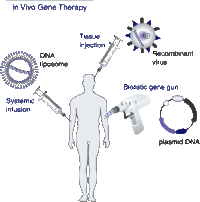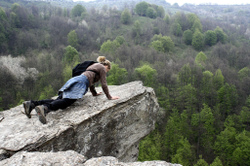Greetings loyal NPA Think Tank readers. It's that time of year to offer my thanks for reading this wandering blog and offer my best wishes for your new year. As a "gift," I present to you three links:
Research Methodology: Media Style

Of course you all know by now that scientists have put exercise into a pill.
This is yet another example of ridiculous interpretation of science by the media. The pill was tested in a mouse! Humans are not mice. Exercise and it’s benefits are extremely complex and multifaceted. The media is going completely bonkers over this very catchy headline. Geez, even the local news in market 115 picked it up last night!
I read the paper and the researchers end it with:
"We believe that the strategy of reorganizing the preset genetic imprint
of muscle (as well as other tissues) with exercise mimetic drugs has
therapeutic potential in treating certain muscle diseases such as
wasting and frailty as well as obesity where exercise is known to be
beneficial."
The might have added:
"Our results should be interpreted cautiously as animal models do not necessarily translate to humans, and the safety and long term effects of these substances have not been evaluated…not even in mice!"
The researches haven’t done much to add caution to the conversation.
“It’s a little bit like a free lunch without the calories,” said Dr. Ronald M. Evans, leader of the Salk group."
I can only image what’s next.
So did my friend Rachael. Here are her upcoming headline suggestions: ‘Pop a pill for a six pack’; ‘NHS saves millions by replacing physios
with a pill’; ‘Health clubs face bankruptcy’; ‘Sudden rise in heart
failure’; ‘Couch potato wins marathon with no training!’
Yikes. This is the last thing we need.
Finally, from the WSJ article linked above:
If the medicine "results in better-looking people, that would be good,"
said comedian Fran Lebowitz. "All I have right now is a vision of slim,
vain, lazy mice."
Physio-Info and the $100G Club
For all of you who were fans of the PABC Physio-Info Blog, it is back on line with renewed vigor! New outreach librarian, Suzanne Geba takes over where Eugene Barsky left off. I’ve always found this blog to be a resource, and I wish Suzanne good luck.
Secondly, as the eye of my consciousness stays pointed toward the west coast, what do you think of this ad for a Home Health Physical Therapist? It encourages applicants to join the "100 Grand Club!"
Salary:
Just announced: Rehab Therapists can earn over $100,000/year. Become a member of the $100 Grand Club!
Umm…
No "clubs" of earning should exist among healthcare professionals! What are we, real estate agents?
ERIC
No Pens? Well at Least My CE is Free!

Just as the AMA was celebrating the vote in their favor against a reduction in the Medicare fee schedule, the doctors across the nation now have to cope with this.
What’s a doc got to do to get a pen around here?!
Small advantages like free pens and pads seem trivial, but they are part of the overall advantage physicians are awarded in the marketplace. Among less trivial freebies is the fact that pharmaceutical companies fund most continuing education for physicians. (That link leads to a good read in BMJ.)
It may seem like no big deal to require a certain amount of continuing education to maintain license when the courses are free…but for other healthcare providers, like physical therapists, (who are busy buying pens and paper on their own) the cost of continuing education courses can be overwhelming at $400 a piece. Pfizer’s recent decision to stop funding courses for docs is a pretty big deal.
And then one begins to ponder whether or not continuing education courses are all that effective…
A New Scientific Method?
I found this post about science without theories to be fascinating.
"It may turn out that tremendously large volumes of data are sufficient
to skip the theory part in order to make a predicted observation."
This correlative science is discussed as part of medical care further down in the article. Perhaps this should be the biggest motivation to comprehensive, vast electronic medical records capable of providing such large data sets that useful information can come from patient encounters.
"…computers can extract patterns in this ocean of data that no human could ever possibly detect."
Dr. Miss America? Dr. Mr. President?

I must first point you to my post at EIM, where I have links galore about Ashley Glenn, the Quinnipiac University Doctor of Physical Therapy student who has been crowned Miss Connecticut.
Next, go check out Respectful Insolence, and find out more about the chiropractor running for president. Seriously.
This listing of presidents by educational level is interesting; Woodrow Wilson served as president with a PhD from Johns Hopkins University. A precedent also exists for Miss America contestants and higher education, in 1974 a law student crowned a doctoral student!
Science Bits
‘You still gotta play the game."
That’s what Nick Zito said when his horse took an upset victory in the Belmont Stakes. Researchers are learning the same lesson, that no matter how obvious a hypothesis may seem, you’ve still gotta do the research.

I’m referring to two recent, large studies which surprised researchers by failing to demonstrate that people with Type 2 Diabetes can reduce their risk of cardiovascular disease by strictly controlling their blood sugar. If asked before the studies, most scientists would assume the opposite, as diabetes increases the risk for cardiovascular disease. It still does that, but perhaps the mechanism by which it does so is not so closely tied to blood sugar control. Both studies will be reported in the upcoming NEJM issue. This makes me wonder about certain physical rehabilitation principles….like,
"…your capacity to make a rational decision is indeed compromised."

Fellow MCG faculty, Dr. Michael Bergeron hit the blog scene in a NYT Well Blog piece about heat illness. Mike tells a story about testing heat illness in his lab and the precautions needed to avoid the, "I’m fine!" syndrome which accompanies high core temperatures. This reminds me about a time that I was mountainbiking and overheated. It came on quickly. I knew I felt bad, but had no idea how hot I was until I stopped…and had trouble using my keys and holding a water bottle to my mouth due to the tremors in my hands.
Take care this summer.
Orthopaedics and Gene Therapy

It is easy to think the effects of gene therapy don’t have much of an impact of the physical therapy profession. After all, we move bodies, stretch them, manipulate them, strengthen them, and teach them. Those are certainly not molecular events! How could molecular events effect my job? Right?
Wrong. Everything is a molecular event!
Check out the abstract for this article in Spine about genetically-induced spinal fusion. I know, its only a rat, and it seems like researchers are not really good at this yet, but I can imagine patients with specific functional deficits receiving gene therapy to help remedy the problem. Muscular Dystrophy, fracture healing, ligament and cartilage healing. Physical therapists equipped to understand the finer points of gene therapy could work closely with physicians to maximize the benefit of the gene expression and optimize outcomes. Throw stem cells in the mix while we’re talking about this as well!
Oh yeah, which physical therapy programs include genetics and gene therapy as part of the curriculum? What’s that you say, another course on goal writing? Alright then.
Just thinking.
Climate Change and Health Care
An editorial in BMJ asks, "How should health professionals take action against climate change?" The piece notes the enormous size of the health industry. Of course, we already know that going to see your physical therapist can help keep you green!
This issue will probably grow.
Push-ups and Stretching

This week I found two nice articles in the New York Times regarding health and fitness.
The first article looks at push-up as a measure of health. The second looks at the controversy that is stretching for sports.
Did you even know stretching before your run is controversial?
Push-up are totally under-rated and are not used very much in physical therapy clinics, often for good reason (fragile shoulders).
"Based on national averages, a 40-year-old woman should be able to do 16
push-ups and a man the same age should be able to do 27."
For the record, I stretch only those muscles which I feel are tight after a light 10 minute warm up, although I think taking your joints through their entire range of motion often is imperative. And, I can do 27,000 push-ups. Really!
ERIC
